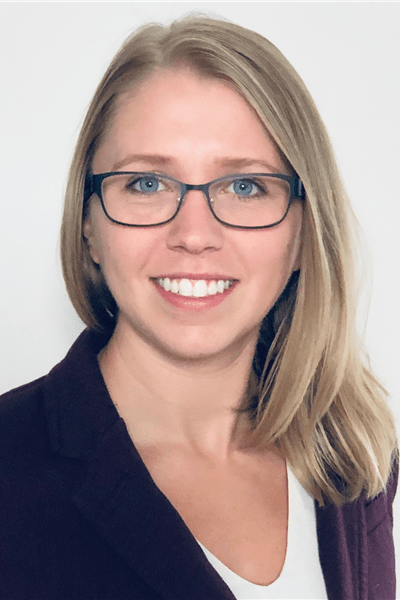
Kara Garcia, PhD
Assistant Professor of Radiology & Imaging Sciences
Navigator, Indiana Clinical and Translational Sciences Institute
- karagarc@iu.edu
- Phone
- (812) 909-7230
- Address
-
515 Walnut Street
Evansville, IN 47708 - PubMed:
-

Bio
Dr. Garcia is an Assistant Professor of Radiology & Imaging Sciences and the Evansville Navigator for the Indiana Clinical & Translational Sciences Institute (Indiana CTSI). Her primary research focuses on mechanics-based modeling and MRI-derived measures to understand brain development and degeneration.
Through her role with the Indiana CTSI, Dr. Garcia supports a number of clinical and translational initiatives across the state. As Evansville Navigator, she connects faculty, clinicians, and residents in Southwest Indiana to services, funding announcements, and collaboration opportunities related to clinical and translational research. She also serves as a statewide contact for investigators interested in expanding their research to Southwest Indiana. As a biomedical engineer, she maintains a special interest in medical device innovations. Since January 2021, she has served as the statewide contact for investigators with medical device innovations through the Indiana CTSI Think Tank program.
At IUSM-Evansville, Dr. Garcia directs the Scholarly Concentration Program for Quality & Innovation in Healthcare and serves as site leader for the IUSM Neuroscience & Behavior course.
Key Publications
Garcia KE, Wang X, Kroenke CD. A model of tension-induced fiber growth predicts white matter organization during brain folding. Nature Communications. 18 Nov 2021.Iannopollo E, Garcia KE. Enhanced detection of cortical atrophy in Alzheimer’s disease using structural MRI with anatomically constrained longitudinal registration. Human Brain Mapping. 14 May 2021.
Garcia KE, Robinson EC, Alexopoulos D, Dierker DL, Glasser MF, Coalson TS, Ortinau CM, Rueckert DR, Taber LA, Van Essen DC, Rogers CE, Smyser CD, Bayly PV. Dynamic patterns of cortical expansion during folding of the preterm human brain. Proceedings of the National Academy of Sciences (PNAS). 5 Mar 2018.
| Year | Degree | Institution |
|---|---|---|
| 2017 | PhD | Washington University |
| 2015 | ME | Washington University |
| 2012 | BS | Purdue University |
As an engineer and biomedical scientist, my research applies physical concepts to understand brain growth and degeneration. Recently, we developed novel, physics-based approach to measure brain growth from longitudinally-collected magnetic resonance imaging (MRI) data, first used to analyze cortical growth in preterm infants. Current work applies this technology to measure cortical changes in utero, during early pediatric development, and during neurodegeneration.
I also use advanced finite element modeling to link cellular changes to macroscopic brain morphology changes. Current NIH-funded work seeks to understand the mechanobiology of brain folding. Future work aspires to translate insights gained from imaging and modeling studies into useful clinical diagnostics and interventions.
Desc: Trustees' Teaching Award
Scope: University
Date: 2024-04-01